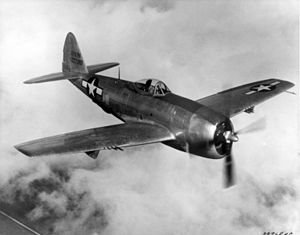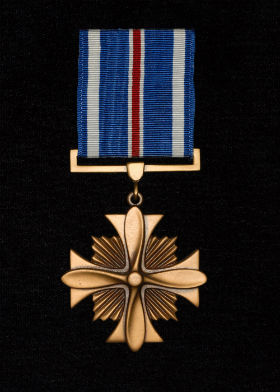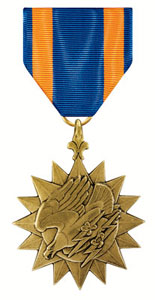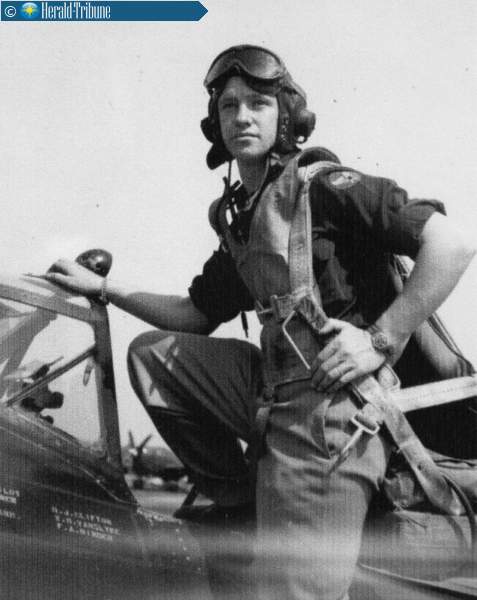Collected and posted by BILL
This site is exclusively for the free access of individual researchers.
* No profit may be made by any person, business or organization through publication, reproduction, presentation or links to this site.
PROFILES
Histories of The Individuals Who Served
Victor E. Bast
World War II - U. S. Army Air Corps
Lieutenant
Colonel (Res)
Victor E. Bast 1942 - 1945 Active Duty 1945 - 1969 Reserves September 17, 1922 - December 23, 2013 burial with military honors: St. Anthony Catholic Cemetery, Oconto Falls, Wisconsin Pilot 56th Fighter Group  Link to: Historic Summary of the 56th Fighter Group - WWII |
 Republic P-47N Thunderbolt in
flight, WWII
|
 Distinguished Flying Cross
|
 7 Air Metal Ribbons
 7 Air Metals Awarded |
|
News Article
Sarasotan flew P-47 in combat in WWII By VICTOR BAST as told to ABBY WEINGARTEN
Published: Friday, May 30, 2008 at 1:52 a.m.In 1941, while working as a teacher in a one-room schoolhouse in rural Wisconsin, Victor Bast enlisted in the Army Air Forces. He became a P-47 Thunderbolt pilot in the 61st Fighter Squadron, 56th Fighter Group of the Eighth Air Force and flew 63 combat missions throughout Europe. His job was to escort B-17s to their targets. He helped destroy and damage scores of enemy planes. After the war, Bast returned to Wisconsin, resumed his teaching career, and earned a bachelor's and a master's degree in education. He remained in the Air Force Reserves until 1972 and retired as a lieutenant colonel with a Distinguished Flying Cross and six Air Medals. Bast worked in education for 41 years as a science instructor and a junior high school principal. He and his wife, Agnes, now split their time between Oconto Falls, Wis., and Sarasota. "I flew with the 56th Fighter Group, which was the highest-scoring Thunderbolt fighter outfit in the Eighth Air Force. Our group destroyed 852 German planes (675 in the air and 177 by strafing). We ended up with more than 1,000 German planes destroyed, which was a record for all of World War II. I was lucky. I got through the war with no problems. I had some problems with my hearing because of all the noise at high altitudes, but that was pretty much it. The most exciting mission was during the Battle of the Bulge. One of the reasons the battle was so hard on the infantrymen was because the weather was terrible. For 10 days, no planes could fly, and it was foggy and raining and snowing. The environment alone ruined everything. Because there was no air cover, the Germans made big progress during that battle. They moved forward over 200 miles and the Americans had to work their way back for a long time after that. Suddenly, on Dec. 21, 1944, the clouds broke up and the sun came out. The Eighth Air Force put up maximum effort. They put 2,000 planes in the air that day to bomb right behind the area to help those guys. Every possible plane that could fly went into the air that afternoon. It so happened that, on that day, I had been flying a lot. I was told I could take a two-day leave. They told you to sleep it off and feel better. The guys would go to London and booze it up and have a big party, but I was married and I didn't care for that much. So on that day, I said I'm going to wait in the barracks and I'm going to go to briefing and sit in on the briefing in the back of the room, hoping someone would get sick. Someone did and the colonel asked if anyone could fly in his place and I said yes. And I shot a plane down that day. It was the biggest air battle of World War II. I shot down an Fw-190 that day; it was the outstanding German fighter. I would have missed it if I had been out drinking." Abby Weingarten may be contacted via e-mail at AbbyWeingarten@Gmail.com ~o~o0o~o~Victor C. Blast Special in Press-Gazette December 26, 2013
After waiting several months, he was called to report to Texas where they were building air bases as fast as possible. After about one year of training at many bases, he got his wings and was sent to England where he was assigned to the 56th Fighter Group as a fighter pilot in P-47 Thunderbolts, the fastest airplane in the world at the time. His group had the record of more enemy planes destroyed than any group in the Army Air Corps. Vic came in with 16 replacements to cover pilots lost in the previous two weeks and only a few lived through to the end of the war. Because losses were so heavy, Vic quickly advanced to a leadership role and by the end of the war had flown 63 missions, destroyed 4 enemy planes and inflicted damage to 11 more in various air battles. In recognition, Vic received the Distinguished Flying Cross as well as the Air Medal 7 times. When the war ended Vic volunteered to go to Japan to be a Squadron Commander but there was no transportation and the war ended by the time he got back home. Following his honorable discharge from the military, Vic began teaching just 3 days after getting home and continued in education for 41 years, 25 as Principal. He was a life member in the American Legion, the Disabled American Veterans and The Military Twenty-Year Club, Inc. of Marinette. Vic remained in the reserves following his discharge and after 24 years retired as a Lt. Col., serving in all offices including commander. |

